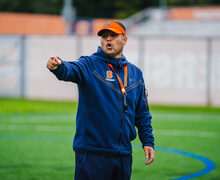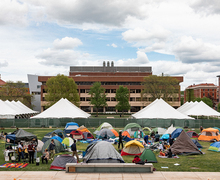A look back at 100 years of SU’s University College
Talia Trackim | Senior Design Editor
University College is currently located at 700 University Ave.
The first semester of Syracuse University’s Evening Session began on Oct. 8, 1918. Open to the general public, the Evening Session gave people the opportunity to take SU classes without enrolling at the university.
A hundred years and many evolutions later, Evening Session has become University College, an SU college that offers a variety of degree programs, certificates and noncredit courses for part-time and post-traditional students.
Evident in the college’s long history is a sense of evolution: The institution has seen many different names, locations, leaders, missions and programs in its efforts to align its education and services with the conditions of the times.
“All of the research that we do here at University College is about the next generation of education,” said University College Dean Michael Frasciello. “We’re always looking forward.”
As of fall 2018, 557 undergraduate and 352 graduate students attend SU part-time through University College.
“After you have a little bit of life behind you, you actually enrich the classroom for the traditional undergraduates who are sitting in there,” said Kimberly Cook, University College’s student administrative services operations specialist, and a graduate of the college. “You bring a lot more perspective into your classes.”
While University College marks 1918 as its official starting point, the roots of the college stretch back even farther. Starting in 1902, the university offered summer classes for part-time students. Twelve years later, then-Chancellor James Day — who oversaw the creation of 22 buildings and 13 new university divisions and schools as chancellor — asked SU professors about the merit of establishing extension classes.
That initial inquiry led to the creation of the Evening Session. Almost 300 students were enrolled in the program’s first semester, according to a 1994 article in The Post-Standard.
A pamphlet advertising the opening of the Evening Session showed 18 different courses, all held at 7:30 p.m. or later. Most courses were held once a week for 15 weeks. Topics included conversational French, recent developments in American education and English drama.
Tuition at the time was $5 a credit. Most of the courses were two credits.
Evening Session classes were first held in SU’s College of Law, which was then located at the corner of East Fayette and South State streets. The university advertised the session as a way for individuals to gain the education needed to excel in conditions created by World War I.

Susie Teuscher | Digital Design Editor
“The war calls for special training and heightens interest in a knowledge of the world and its affairs. To meet this situation, Syracuse University will open to the general public,” the 1918 pamphlet reads.
The Evening Session was renamed the School of Extension Teaching, and in 1930 was renamed again to the School of Extension Teaching and Adult Education. Walter Norton, who was director at the time, said the change reflected a growing belief that people should have more education than just high school and the introduction of SU courses to meet such demands, according to a Syracuse Herald-Journal article.
“Competition for the best jobs has become so keen that the ambitious man finds himself compelled to keep abreast of changing developments in his own field by carefully directed study,” Norton said in the article.
In August 1946, the college saw another name change as the School of Extension Teaching and Adult Education was reorganized into University College.
“As the School of Extension Teaching and of Adult Education it has brought campus teaching facilities downtown to serve the community at large,” a section of the Syracuse Herald-Journal read. “Now it is to place increased emphasis on adult education and also enroll overflow students from the main institution.”
Currently, University College is located at 700 University Ave., across from the Martin J. Whitman School of Management. But it did not move to that location until 1998. The college used to be located at SU’s College of Medicine, later renamed Peck Hall, at 601 E. Genesee St., until Reid Hall at 610 E. Fayette Street was renovated in 1957 for the college’s use.
Peck Hall is now home to SU’s Couple and Family Therapy Center, and Reid Hall houses the McMahon/Ryan Child Advocacy Center.
Before it became home to University College, 700 University Ave. was the Grover Cleveland residence hall for men at SU.
University College celebrated the past 100 years by putting together a multimedia campaign, including a testimonial wall in the college and a video, that displayed stories of former University College students.
The college’s marketing team won a bronze award in the 2018 University Professional Continuing Education Association’s Marketing Awards Competition for the project.
“We always say ‘life gets in the way’ for a lot of our students,” Frasciello said. “So when you’re able to see someone transform their life through this simple thing of a college education later in life … being part of an organization that that’s what we do everyday, it’s really incredible.”
Cook, who graduated in 2006, was a single working mother while she was a student.
She said she remembers being a student and requesting day care for University College students. While a change didn’t happen before she graduated, Cook said, a few years later the college introduced child care grants.
“The employees at University College really empathize with the situation that these students are coming back to school under,” said Lyndy McLaughlin, the college’s digital communications manager and a current part-time SU student.
University College is planning to roll out one market-sensitive online undergraduate program each year for the next four years, Frasciello said. The focus of the programs has not yet been determined, Frasciello said, but they will likely be in the areas of communication, health and wellness and business administration.
A long-term goal of the college is to work with other SU schools and colleges to help expand programming to be more inclusive of post-traditional students, he said.
Frasciello said higher education is still evolving and will soon begin to focus more on post-traditional student programming and the expansion of online education for full-time, residential students.
“Students today are different than they were as recently as 10 years ago,” he said.
University College is continually growing and improving in its effort to help students attain their goals, Cook said.
“It’s life changing for people,” she said.
Published on October 15, 2018 at 10:09 pm
Contact India: [email protected]





